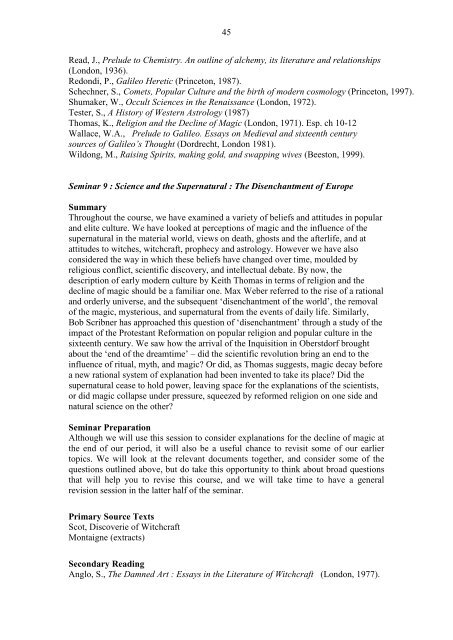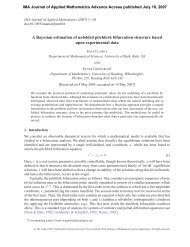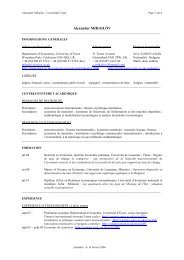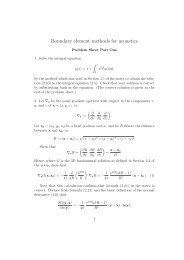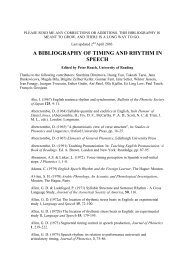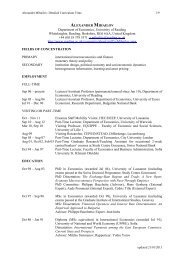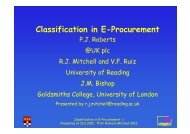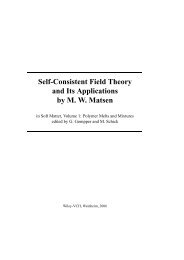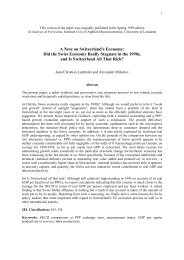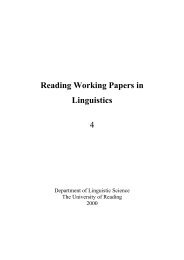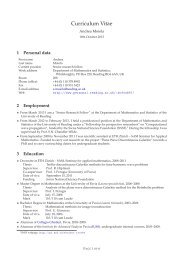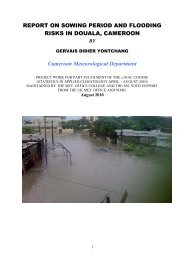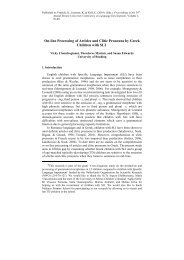Ritual, Myth and Magic in Early Modern Europe - University of Reading
Ritual, Myth and Magic in Early Modern Europe - University of Reading
Ritual, Myth and Magic in Early Modern Europe - University of Reading
Create successful ePaper yourself
Turn your PDF publications into a flip-book with our unique Google optimized e-Paper software.
45<br />
Read, J., Prelude to Chemistry. An outl<strong>in</strong>e <strong>of</strong> alchemy, its literature <strong>and</strong> relationships<br />
(London, 1936).<br />
Redondi, P., Galileo Heretic (Pr<strong>in</strong>ceton, 1987).<br />
Schechner, S., Comets, Popular Culture <strong>and</strong> the birth <strong>of</strong> modern cosmology (Pr<strong>in</strong>ceton, 1997).<br />
Shumaker, W., Occult Sciences <strong>in</strong> the Renaissance (London, 1972).<br />
Tester, S., A History <strong>of</strong> Western Astrology (1987)<br />
Thomas, K., Religion <strong>and</strong> the Decl<strong>in</strong>e <strong>of</strong> <strong>Magic</strong> (London, 1971). Esp. ch 10-12<br />
Wallace, W.A., Prelude to Galileo. Essays on Medieval <strong>and</strong> sixteenth century<br />
sources <strong>of</strong> Galileo’s Thought (Dordrecht, London 1981).<br />
Wildong, M., Rais<strong>in</strong>g Spirits, mak<strong>in</strong>g gold, <strong>and</strong> swapp<strong>in</strong>g wives (Beeston, 1999).<br />
Sem<strong>in</strong>ar 9 : Science <strong>and</strong> the Supernatural : The Disenchantment <strong>of</strong> <strong>Europe</strong><br />
Summary<br />
Throughout the course, we have exam<strong>in</strong>ed a variety <strong>of</strong> beliefs <strong>and</strong> attitudes <strong>in</strong> popular<br />
<strong>and</strong> elite culture. We have looked at perceptions <strong>of</strong> magic <strong>and</strong> the <strong>in</strong>fluence <strong>of</strong> the<br />
supernatural <strong>in</strong> the material world, views on death, ghosts <strong>and</strong> the afterlife, <strong>and</strong> at<br />
attitudes to witches, witchcraft, prophecy <strong>and</strong> astrology. However we have also<br />
considered the way <strong>in</strong> which these beliefs have changed over time, moulded by<br />
religious conflict, scientific discovery, <strong>and</strong> <strong>in</strong>tellectual debate. By now, the<br />
description <strong>of</strong> early modern culture by Keith Thomas <strong>in</strong> terms <strong>of</strong> religion <strong>and</strong> the<br />
decl<strong>in</strong>e <strong>of</strong> magic should be a familiar one. Max Weber referred to the rise <strong>of</strong> a rational<br />
<strong>and</strong> orderly universe, <strong>and</strong> the subsequent ‗disenchantment <strong>of</strong> the world‘, the removal<br />
<strong>of</strong> the magic, mysterious, <strong>and</strong> supernatural from the events <strong>of</strong> daily life. Similarly,<br />
Bob Scribner has approached this question <strong>of</strong> ‗disenchantment‘ through a study <strong>of</strong> the<br />
impact <strong>of</strong> the Protestant Reformation on popular religion <strong>and</strong> popular culture <strong>in</strong> the<br />
sixteenth century. We saw how the arrival <strong>of</strong> the Inquisition <strong>in</strong> Oberstdorf brought<br />
about the ‗end <strong>of</strong> the dreamtime‘ – did the scientific revolution br<strong>in</strong>g an end to the<br />
<strong>in</strong>fluence <strong>of</strong> ritual, myth, <strong>and</strong> magic? Or did, as Thomas suggests, magic decay before<br />
a new rational system <strong>of</strong> explanation had been <strong>in</strong>vented to take its place? Did the<br />
supernatural cease to hold power, leav<strong>in</strong>g space for the explanations <strong>of</strong> the scientists,<br />
or did magic collapse under pressure, squeezed by reformed religion on one side <strong>and</strong><br />
natural science on the other?<br />
Sem<strong>in</strong>ar Preparation<br />
Although we will use this session to consider explanations for the decl<strong>in</strong>e <strong>of</strong> magic at<br />
the end <strong>of</strong> our period, it will also be a useful chance to revisit some <strong>of</strong> our earlier<br />
topics. We will look at the relevant documents together, <strong>and</strong> consider some <strong>of</strong> the<br />
questions outl<strong>in</strong>ed above, but do take this opportunity to th<strong>in</strong>k about broad questions<br />
that will help you to revise this course, <strong>and</strong> we will take time to have a general<br />
revision session <strong>in</strong> the latter half <strong>of</strong> the sem<strong>in</strong>ar.<br />
Primary Source Texts<br />
Scot, Discoverie <strong>of</strong> Witchcraft<br />
Montaigne (extracts)<br />
Secondary Read<strong>in</strong>g<br />
Anglo, S., The Damned Art : Essays <strong>in</strong> the Literature <strong>of</strong> Witchcraft (London, 1977).


